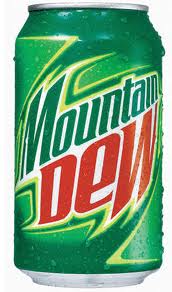Caffeinated Kids
 Monday, December 20, 2010 at 9:28AM
Monday, December 20, 2010 at 9:28AM  A 12-oz can of Mountain Dew contains 54 miligrams of caffeineIt's 9AM. Do you know how much caffeine your kids have consumed? In a study published in The Journal of Pediatrics, researchers found that 75 percent of children surveyed consumed caffeine on a daily basis.
A 12-oz can of Mountain Dew contains 54 miligrams of caffeineIt's 9AM. Do you know how much caffeine your kids have consumed? In a study published in The Journal of Pediatrics, researchers found that 75 percent of children surveyed consumed caffeine on a daily basis.
Dr. William Warzak and colleagues from the University of Nebraska Medical Center surveyed the parents of over 200 children 5 to 12 years old during routine clinical visits at an urban pediatric clinic. Parents were asked to report the types and amounts of snacks and beverages their child consumed on a daily basis.
According to ScienceDaily, Dr. Warzak said, "Some children as young as five years old were consuming the equivalent of a can of soda a day." The study's authors also noticed that the older children drank more caffeinated beverages. "Children between the ages of 8 and 12 years consumed an average of 109 mg a day," Dr. Warzak explains, "the equivalent of almost 3 12-ounce cans of soda."
The study suggested that parents are often unaware of their children's actual caffeine intake. It might surprise some to discover that a 12-ounce can of Mountain Dew contains 54 miligrams of caffeine. For comparison, the same size serving of Coke packs 35 mgs; Pepsi 38; Sunkist Orange Soda 41; and Sprite brings up the rear with zero mgs.
Caffeine can interfere with sleep and some studies have shown that adolescent obesity is associated with getting less than ideal amounts of sleep. In addition to high caffeine intake, reduction in sleep could be related to more hours of technology use and increased symptoms of sleep disorders, such as snoring. Poor sleep has also been associated with obesity, or high body mass index (BMI). But Amy Drescher, PhD, research specialist at the University of Arizona in Tucson, noted last year that there are many reasons that kids gain weight, and inadequate sleep is just one of them.
 Kathy
Kathy
A study out February 14 of Energy Drink usage in teens by researchers at the Cleveland Clinic found that in 2007, 46 percent of the 5,448 caffeine overdoses in the United States occurred in those younger than 19. The investigators also found that 30 to 50 percent of adolescents and young adults consume energy drinks, which contain high amounts of caffeine and are unregulated.

Reader Comments